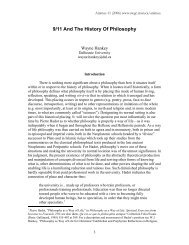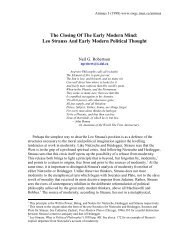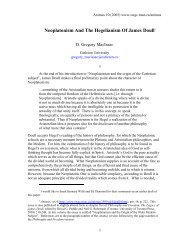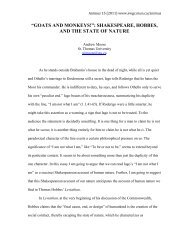Floy E Andrews, On Reading Philosophy after Analytic Philosophy.
Floy E Andrews, On Reading Philosophy after Analytic Philosophy.
Floy E Andrews, On Reading Philosophy after Analytic Philosophy.
Create successful ePaper yourself
Turn your PDF publications into a flip-book with our unique Google optimized e-Paper software.
ANDREWS: ON READING PHILOSOPHY AFTER ANALYTIC PHILOSOPHY<br />
As a case in point, consider Peter Geach's identification of what he takes to be a<br />
common fallacy in passages from Aristotle, Plato, Berkeley and Spinoza. He argues<br />
informally 22 but it is clear that his thought is thoroughly informed by the "classical logic"<br />
analysis of quantification and modal logic. The first critique is:<br />
At the beginning of the Nicomachean Ethics Aristotle passes from "We do<br />
not choose everything for the sake of something else, for that way one<br />
would go on ad infinitum, and the pursuit would be empty and vain" to<br />
"There is some end of actions which we make an object of will for its own<br />
sake, and everything else for its sake ... this would be the good and the<br />
best" (1094a18-22). It is clear that he thinks himself entitled to pass from:<br />
"Every series whose successive terms stand in the relation chosen for the<br />
sake of has a last term" to "There is something that is the last term of every<br />
series whose successive terms stand in the relation chosen for the sake<br />
of". 23<br />
This is presumably the same passage to which Anscombe refers above - she gives no<br />
reference. It is abundantly clear to this reader of the passage, what precedes it, what<br />
follows it, that Anscombe and Geach misconstrue it entirely. The passage in question<br />
reads, not as Geach has given it, but as follows:<br />
If then there is some end of the things we do which we desire for its own<br />
sake (everything else being desired for the sake of this), and if we do not<br />
choose everything for the sake of something else (for at that rate the<br />
process would go on to infinity, so that our desire would be empty and<br />
vain) clearly this must be the good and the chief good. 24<br />
Geach takes what is in fact the premise as Aristotle's conclusion. 25 The whole paragraph<br />
which precedes this passage (1094a1-17) is the explanation and justification for that<br />
premise. It begins, "Every art and every inquiry, and similarly every action and pursuit, is<br />
thought to aim at some good." Aristotle observes that some arts fall under others, and<br />
where this occurs the master art is preferred, is the higher good, to the subordinate ends.<br />
Then he continues with the passage in question, concluding that whatever is the end<br />
desired for its own sake, for the sake of which everything else is desired, must be the<br />
highest good. Of the minor, that there is not an endless subordination of means to ends,<br />
John Burnet says, "In other words, we should never desire anything at all, unless there<br />
were something we desire for its own sake and not for the sake of anything else." 26<br />
22 He gives as his reason, "But the application of formal logic to statements made in the vernacular has<br />
lately been rather blown upon [sic]...", that is, by ordinary language philosophers. "History of a Fallacy" in<br />
Logic Matters, 1.<br />
23 Ibid., I2.<br />
24 Ethica Nicomachea, trans. W.D.Ross, Oxford, 1915, 1094a18-21.<br />
25 St. Thomas Aquinas calls it the major: "Quarum principalis talis est. Quicumque finis est talis, quod alia<br />
volumus propter ipsum ..." In Ethicorum Aristotelis ad Nicomachum Expositio, Rome, 1949, 6.<br />
26 . The Ethics of Aristotle, ed. John Burnet, London, 1900, xlvi-xlvii.<br />
100

















